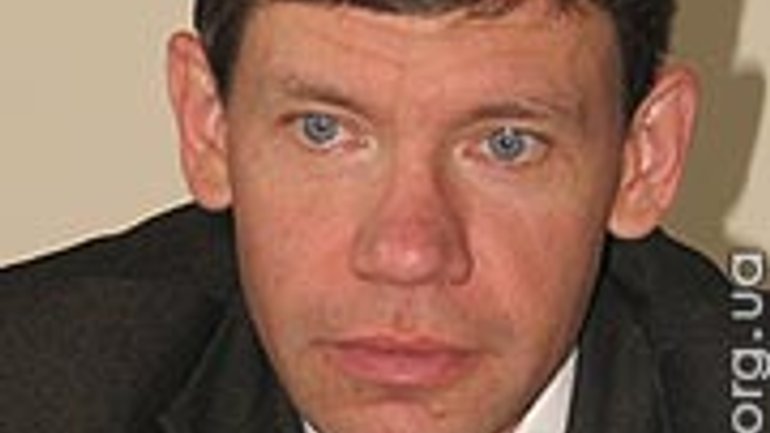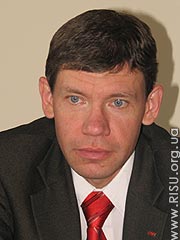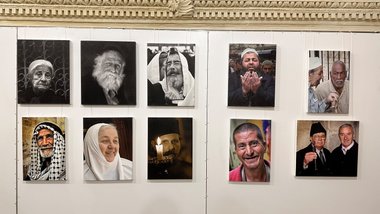"The Ukrainian community remains multidenominational and practically all components of the religious network in Ukraine demonstrate positive dynamics in the growth of their religious organizations"

 — What are the special features of tthe official statistics of religious organizations from January 1 of this year? Which confessions are developing the quickest, what new ones are appearing?
— What are the special features of tthe official statistics of religious organizations from January 1 of this year? Which confessions are developing the quickest, what new ones are appearing?
On January 1, 2010, the religious network of Ukraine counted 35,184 religious organizations. In particular, 18,000 Orthodox religious organizations, of which the UOC-MP makes up 12,082, the UOC-KP – 4,415, the UAOC – 1,234, 3,765 religious institutions are part of the Ukrainian Greek Catholic Church, and 1,079 are part of the Roman Catholic Church. Also in Ukraine there are more than 8,400 Protestant organizations. In addition, there are 297 Jewish institutions and 1,182 Muslim ones.
In the year 2009 the religious network increased by 719 religious organizations, the biggest growth was found in the Orthodox Church: the UOC-MP increased its structure by 256 religious organizations, the UOC-KP by 159, the UAOC by 14. The UGCC increased its network by 33 religious organizations. The number of Protestant religious organizations increased by 150 bodies; however, the number of Charismatic communities did not increase in the last year. I will also note the growth of Muslim organizations by 33 bodies, and not only in Crimea but throughout the territory of Ukraine.
— Why, in your opinion, is there this sort of development of various denominations?
— It seems to me that today’s special features in the growth of various confessions in Ukraine are tied in with many factors. These include the traditional religious mentality of our people (Orthodox and Greek Catholic), the use of new methods of work with various sections of the population by Orthodox churches that before were only used by Protestant religious communities, the Ukrainian Orthodox Church’s increased emphasis on missionary work, and the decrease in help to Protestant communities from faithful abroad due to the crisis. But along with that I would like to stress that the Ukrainian community remains multidenominational and practically all components of the religious network in Ukraine demonstrate positive dynamics in the growth of their religious organizations.
— There exist certain myths about the denominational composition in Ukraine, in particular, about the influence of religious “sects.” What is the true state of the presence of new religious movements in Ukraine? Particularly, are organizations registered (like, for example, Scientology) which in many European countries are either prohibited or registered not as religious organizations?
— In reality, the thesis about the “influence of sects” is exaggerated. The statistics fairly unambiguously demonstrate that new religious movements make up an insignificant percentage of the religious network, in which dominates first and foremost the Orthodox Churches and other religious communities traditional for Ukraine (Greek and Roman Catholic, Protestant, Jewish, and Muslim). We also don’t observe tendencies of active growth in the number of religious organizations that belong to the new religious movements.
Currently in Ukraine religious organizations whose activity could harm the interests of the state or the citizens are not registered. We carefully study the experience in other countries.
As for the Church of Scientology, currently its centers are not registered in Ukraine as religious organizations, though we have information about their activity as civic organizations in a few cities.
— What misunderstandings occur most frequently during registration of organizations, what are the reasons for refusal to register?
— The Law of Ukraine on the Freedom of Conscience and Religious Organizations rather clearly defines the possible reasons for refusal to register religious organizations. The law reads that “the registration of a status (statute) of a religious organization can be refused if its status (statute) or activity violates the current legislation.” The State Committee on Nationalities and Religions along with other registration bodies designated by the legislation abide by the law when making decisions about the registration of specific religious communities.
— Where there cases where organizations were unregistered and why?
— In the last year, as far as I know, there were no such cases. Today a matter is being discussed about the possibility of stopping the activity of specific religious organizations due to certain doubts about the responsibility of their activity before the current legislation. But I want to stress that the decision about such questions is not made by the registration office but exclusively by court, as is foreseen in the current law.
— Where there court cases or grievances regarding registration?
— Yes, such incidents occur. Here I am referring to the attempt of the so-called “orthodox synod of the UGCC” to legalize its status in Ukraine by registering “Ukrainian orthodox Greek Catholic Church.” They appealed our actions to the court. Today this matter is under judicial review.
— What do you foresee in the development of the religious map of Ukraine?
— It looks as though the positive dynamics of growth in the number of religious organizations in Ukraine will continue in the near future. By this I mean not the appearance of new religious trends, but rather the growth in the number of religious organizations in the structures of Ukraine’s traditional confessions. Along with this, I don’t see any reason to expect such significant levels of growth in the religious sphere as occurred in the late 90s of last century.
Lviv-Kyiv, March 8, 2010










